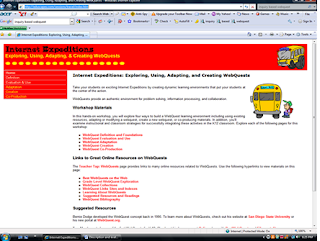
Since then, a surplus of WebQuest sites have popped up all over the Internet, including that of Tom March who helped break WebQuests into the k-12 market. The trick becomes identifying which is a quality assignment and which is a scavenger hunt in disguise. The good news is that there are countless rubrics and descriptions of what a quality WebQuest should look like. The bad news is picking one out to follow.
The WebQuest I focused on was found under Eduscapes’grade level literature WebQuests.

It is a WebQuest I have utilized as a resource with my 4th grade students, titled “The Realm of Fairy Tales.” In this WebQuest the tasks are: read 8 out of 15 fairy tales online, analyze the fairy tales by identifying recurring themes using a Themes Chart, outline a story map for your own fairy tale, then write your own fairy tale based on your story map.
This lesson is geared toward 4-5 grade students. The tasks seemed straightforward and easy for students to understand. The Themes Chart was well organized and broken down into 8 characteristics that are found in many fairy tales, making it easy for students to check off characteristics that are listed on the Themes Chart as they read each fairy tale. Each of the stories were 2-3 pages in length but would require a student to be reading on grade level to accurately understand. After reading students fill out a story map and begin creating their own fairy tales.
In all, this WebQuest provided excellent resources but was not, in my opinion, one utilizing higher order thinking skills (at least not until they create their own fairy tale at the end of the assignment). A better approach would have been to have students compare 3-4 fairy tales (8 seems too many- students would tend to become distracted after a few) and to decide for themselves what the common themes were- not to be told beforehand what to look for. To further the use of technology integration, students could work in teams to create a fairy tale then create a VoiceThread or podcast of their story.
Below are a few of the resources that I found helpful when using WebQuests in the classroom:
Building blocks of a WebQuest (detailed description of each step with examples
A WebQuest about WebQuests for elementary school teachers
Eduscapes’ site on all things WebQuest
.jpg)
Nicole did you find any WebQuests for younger kids that used a lot of HOTS? I really had a hard time finding Quests that used HOTS all the way through. When I did my rubric that was the first criteria I added. However the one WebQuest I found on zoo animals was actually well put together, easy to use and seemed as if students can learn a lot and use lot of skills, but the questions were not very higher order.
ReplyDeleteThe resources you provided are very informative. Reviewing WebQuests has been helpful to me to an extent but because I have never created one myself the step by step instructions your resources provide will definitely put me on the right track for designing one on my own. These resources will also be excellent to share with other teachers at my school, following the model in "A WebQuest About WebQuests" will promote collaboration as we are infusing technology into the curriculum across grade levels.
ReplyDeleteStella
Nicole, Thanks for the sites and the information. I will be using a couple of them as I start my "Webquest." I am glad that you provided ideas for a webquest for 4th grade teachers. I will be using that site during the teacher training for the tech magnet schools. Since I will be working with 4th grade teachers on what is expected of them and their students, the webquest you mentioned will become part of that presentation. The site appears to be one that will help teachers become comfortable with the concept of "webquest," that it is more than just an "internet scaventger hunt." "The Realm of Fairy Tales" should encourage teachers to try to creat their own "webquest."
ReplyDelete